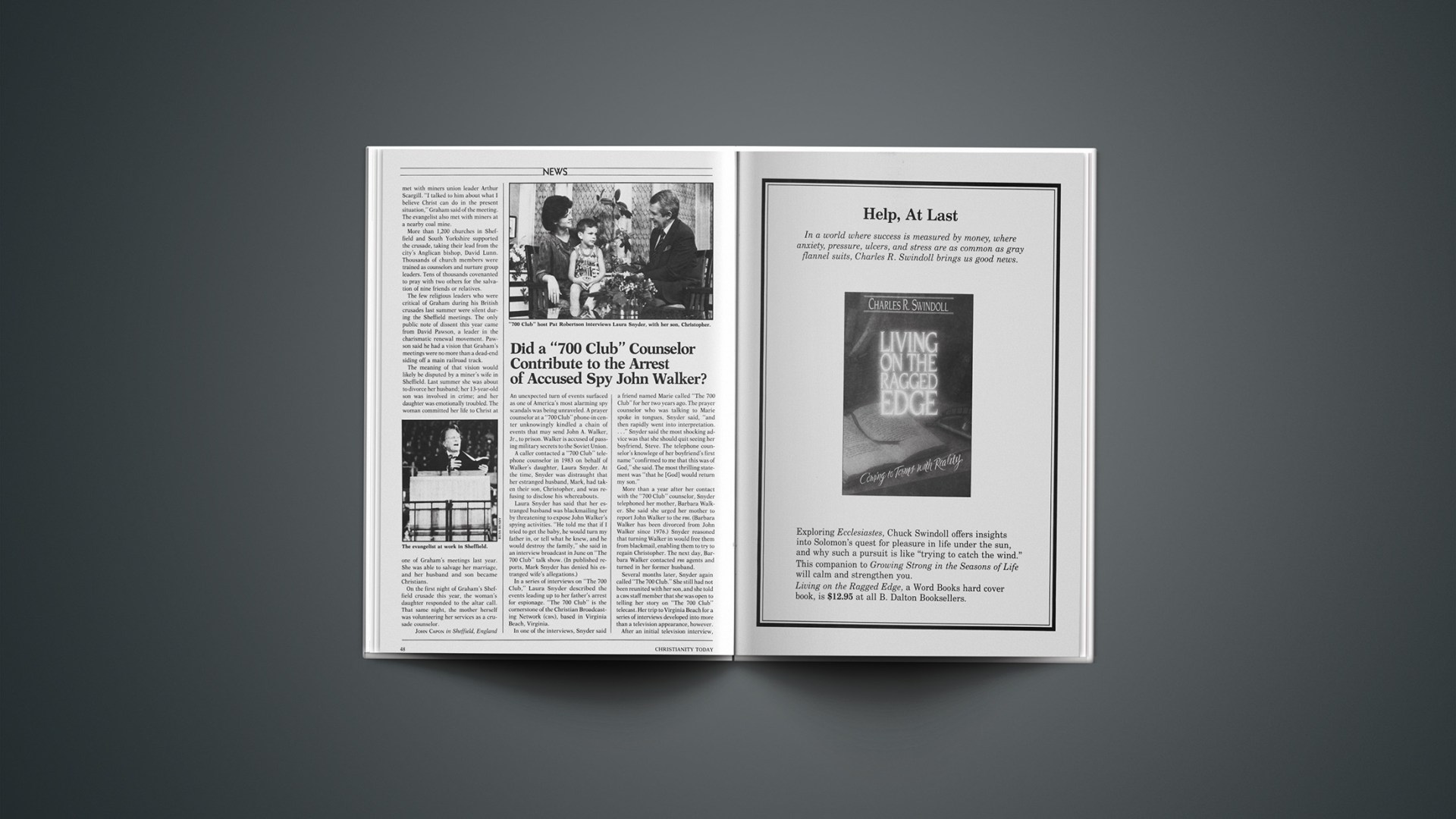An unexpected turn of events surfaced as one of America’s most alarming spy scandals was being unraveled. A prayer counselor at a “700 Club” phone-in center unknowingly kindled a chain of events that may send John A. Walker, Jr., to prison. Walker is accused of passing military secrets to the Soviet Union.
A caller contacted a “700 Club” telephone counselor in 1983 on behalf of Walker’s daughter, Laura Snyder. At the time, Snyder was distraught that her estranged husband, Mark, had taken their son, Christopher, and was refusing to disclose his whereabouts.
Laura Snyder has said that her estranged husband was blackmailing her by threatening to expose John Walker’s spying activities. “He told me that if I tried to get the baby, he would turn my father in, or tell what he knew, and he would destroy the family,” she said in an interview broadcast in June on “The 700 Club” talk show. (In published reports, Mark Snyder has denied his estranged wife’s allegations.)
In a series of interviews on “The 700 Club,” Laura Snyder described the events leading up to her father’s arrest for espionage. “The 700 Club” is the cornerstone of the Christian Broadcasting Network (CBN), based in Virginia Beach, Virginia.
In one of the interviews, Snyder said a friend named Marie called “The 700 Club” for her two years ago. The prayer counselor who was talking to Marie spoke in tongues, Snyder said, “and then rapidly went into interpretation.…” Snyder said the most shocking advice was that she should quit seeing her boyfriend, Steve. The telephone counselor’s knowlege of her boyfriend’s first name “confirmed to me that this was of God,” she said. The most thrilling statement was “that he [God] would return my son.”
More than a year after her contact with the “700 Club” counselor, Snyder telephoned her mother, Barbara Walker. She said she urged her mother to report John Walker to the FBI. (Barbara Walker has been divorced from John Walker since 1976.) Snyder reasoned that turning Walker in would free them from blackmail, enabling them to try to regain Christopher. The next day, Barbara Walker contacted FBI agents and turned in her former husband.
Several months later, Snyder again called “The 700 Club.” She still had not been reunited with her son, and she told a CBN staff member that she was open to telling her story on “The 700 Club” telecast. Her trip to Virginia Beach for a series of interviews developed into more than a television appearance, however.
After an initial television interview, Snyder and a friend traveled to Mark Snyder’s Maryland apartment and whisked five-year-old Christopher away soon after he stepped outside. (A CBN attorney had secured Mark Snyder’s address.) Authorities said no charges would be filed against Laura Snyder because neither parent has legal custody of the child.
Snyder later appeared on “The 700 Club” with her son. She characterized her father as “arrogant, self-centered, egotistical.” She said he was motivated to spy by “money, greed, selfishness.… He wanted to live in the greatest country in the world and to have all the benefits, … but he didn’t want to be loyal to it. He would rather sell it.”
She said she supposes that Walker will “spend the rest of his life in jail.” At the same time, Snyder said, “it’s another thing to spend eternity in hell. I don’t want that for him.”
Catholic Bishops Closer To Associate Member Status In Canadian Council Of Churches
The Canadian Conference of Catholic Bishops is one step closer to becoming an associate member of the Canadian Council of Churches.
Delegates to the ecumenical council’s triennial convention unanimously approved a constitutional amendment that paves the way for admission of the Catholic bishops’ organization as an associate member.
The Canadian Council of Churches claims 13 member bodies, including most mainline Protestant denominations, two Orthodox bodies, the Salvation Army, and the Polish National Catholic Church of Canada. The Canadian Conference of Catholic Bishops already has applied for admission as an associate member. The application is expected to be approved by the required two-thirds vote of the ecumenical council’s members and ratified at the autumn meeting of its general board. Associate members will be eligible to vote on all council matters, except those related to the organization’s constitution and the admission of new members.
According to the 1981 Canadian census, Roman Catholics form 47 percent of the country’s population—compared to just over 41 percent for all Protestants. That ratio would give Catholics a majority in a truly representative ecumenical body.
The stipulations attached to the new associate member status are designed to offset that preponderance. An associate member, for instance, will be granted council representation based on only 20 percent of its membership. That restriction would give Catholics about the same representation as the Anglican Church of Canada, the second-largest member body in the Canadian Council of Churches.
In the United States, the National Conference of Catholic Bishops is not a member of the National Council of Churches (NCC). An NCC representative said that although the Catholic church never had applied, it is eligible for full NCC membership.
LESLIE K. TARR in Toronto










